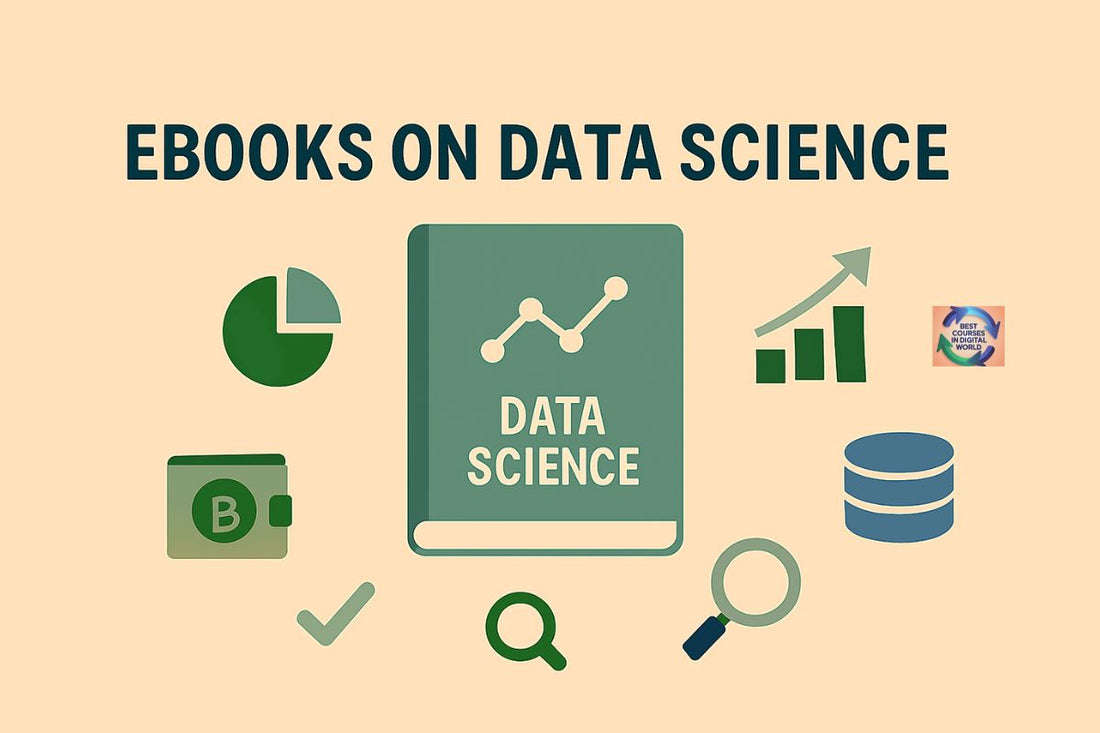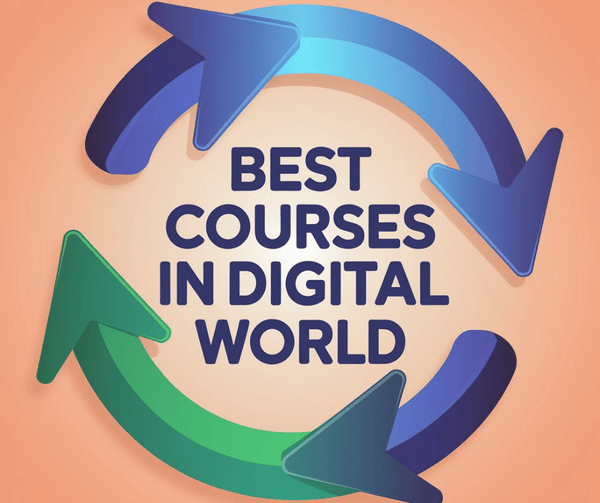
Top 8 Data Science ebooks for Beginners
Data Science eBooks provide a structured and accessible way to learn data analysis, machine learning, statistics, and programming skills. These resources are ideal for building a strong foundation in data-driven thinking and real-world problem-solving.
📘 Uses:
- Learn key concepts in data science, from basics to advanced
- Practice data analysis, visualization, and model building
- Understand tools like Python, R, SQL, and Excel
- Prepare for interviews or career transitions into data roles
🎯 Who Can Benefit:
- Students and beginners exploring data science
- Aspiring data analysts, scientists, and engineers
- Professionals upskilling in tech or analytics
- Anyone curious about data-driven decision-making
Here are the eBooks to master Yourself in this field
- Data Science from Scratch – Joel Grus

Level: Beginner to Intermediate
Approach: Hands-on, project-based, with a strong focus on coding from the ground up
Best For: Aspiring data scientists who want to truly understand how things work under the hood
Description:
This is not your typical plug-and-play Python book. Data Science from Scratch walks you through building real data science tools from the ground up using Python. Instead of relying on pre-built libraries, you’ll write your own algorithms—think linear regression, decision trees, and neural networks—step by step.
It’s perfect for learners who want a deep, hands-on experience and a solid technical foundation. Joel Grus keeps the tone light and engaging, making even complex math feel approachable. Expect to code a lot, experiment more, and truly ‘get’ data science.
Whether you're brushing up your Python or stepping into data science for the first time, this book is your practical launchpad.
✨ Explore Data Science Ebooks
Learn the latest techniques in ML and big data from leading experts.
View ebooks Details & Pricing
2. Essential Math for Data Science – Thomas Nield

Level: Beginner to Intermediate
Approach: Theory-light, intuition-first, hands-on with visual explanations and practical code
Best For: Data enthusiasts, analysts, and coders who need to strengthen their math without getting overwhelmed
Description:
If math feels like a hurdle in your data science journey, this book is your friendly guide to mastering the essentials without the heavy formulas. Thomas Nield breaks down core math concepts like linear algebra, probability, statistics, and calculus in a way that’s easy to understand—and immediately applicable.
What makes it different? It focuses on building intuition through real-world Python examples, visual aids, and mini-projects rather than textbook-style proofs. You’ll learn just enough math to understand and build machine learning models, work with data confidently, and interpret results accurately.
No advanced math degree required—just curiosity and a desire to truly understand the numbers behind the models.
3. Practical Statistics for Data Scientists – Peter Bruce, Andrew Bruce & Peter Gedeck

Level: Beginner to Intermediate
Approach: Hands-on, practical-first, with clear examples in R and Python
Best For: Aspiring data scientists and analysts who want to apply statistics without getting lost in theory
Description:
This book is a go-to guide for making statistics feel useful, not intimidating. It skips the dry theory and dives straight into what data scientists really need to know—like sampling, regression, classification, and statistical machine learning.
With side-by-side code examples in both R and Python, you'll not only understand the concepts but also see them in action. Each chapter is filled with real-world tips and techniques that you can apply to your projects right away.
Whether you're prepping for a data science role or leveling up your analysis skills, this book keeps it clear, relevant, and project-focused—exactly what today’s data world needs.
4. A Hands on Introduction to Data Science – Chirag Shah

Level: Beginner
Approach: Project-based, practical-first, with minimal math and lots of real-world context
Best For: Students, career switchers, and curious minds who want to start data science with real examples and a solid foundation
Description:
This book is designed for absolute beginners who want a clear, accessible, and practical way to enter the world of data science. Chirag Shah takes you through the entire data science workflow—from asking good questions and gathering data to analyzing and visualizing results—with real case studies along the way.
No heavy stats or programming background needed! You’ll learn key tools like Python, pandas, and Jupyter notebooks, and work on hands-on projects that teach you how to think like a data scientist. The focus is always on solving problems and making data useful, not just crunching numbers.
If you're looking for a gentle but effective introduction with plenty of practice and zero fluff, this is the place to start.
5. Introduction to Data Science: Practical Approach with R and Python - Uma Maheshwari & R. Sujatha
Level: Beginner
Approach: Hands-on and structured, with step-by-step coding examples in both R and Python
Best For: Students and early learners looking for a dual-language (R + Python) introduction to data science fundamentals
Description:
This book takes a clear and practical path into the world of data science, using both R and Python to help you build a well-rounded foundation. It covers everything from data wrangling and visualization to basic machine learning, making it ideal for beginners who want to learn by doing.
Each chapter includes easy-to-follow code, real examples, and exercises, so you can practice as you learn. It’s especially useful if you're transitioning from statistics or analytics into data science and want to get comfortable with coding in both key languages.
Whether you're a student, researcher, or just curious, this book gives you a practical starting point—with tools you’ll actually use in real-world projects.
✨ Explore Data Science Ebooks
Learn the latest techniques in ML and big data from leading experts.
View ebooks Details & Pricing
6. Data Science for Business: What you need to know about Data Mining and Data Analytical thinking – Foster Provost & Tom Fawcett

Approach: Concept-first, real-world examples, focused on decision-making and strategy
Best For: Business professionals, managers, and data-curious minds who want to understand how data science creates value
Description:
This isn’t a how-to code book—it’s a how-to think book. Data Science for Business shows you the strategic side of data science, breaking down key concepts in data mining, analytics, and machine learning in a way that’s clear and business-focused.
Foster Provost and Tom Fawcett use real-world scenarios to explain how data-driven decisions are made—and how to spot good data science from bad. You'll learn the "why" behind the "how," which makes it a perfect read for professionals who need to bridge the gap between business goals and data insights.
Ideal for decision-makers, marketers, product teams, or anyone who works with (or wants to work with) data scientists.
7. Introduction to Machine Learning with Python - A Guide for Data Scientist – Andreas C Mullers

Level: Beginner to Intermediate
Approach: Hands-on, code-rich, and focused on practical applications using Python and scikit-learn
Best For: Python users who want to build real machine learning models and understand how they work
Description:
If you're ready to move from basic Python to building real machine learning models, this book is the perfect next step. Written by one of the core developers of scikit-learn, it’s packed with practical guidance, example code, and real workflows to get you started fast.
You’ll learn how to handle datasets, choose algorithms, train models, and evaluate results—all using clear explanations and step-by-step examples in Python. No advanced math or theory overload here—just the essentials you need to get productive with machine learning.
Great for developers, analysts, and self-learners looking for a solid, practical introduction to applied machine learning.
8. Python For Data Analysis: Data Wrangling with Pandas, NumPy and IPython – Wes McKinney

Level: Beginner to Intermediate
Approach: Hands-on, code-intensive, and focused on real-world data workflows
Best For: Analysts, data scientists, and Python users who want to master data wrangling and analysis with modern tools
Description:
Written by the creator of pandas, this book is a must-have for anyone serious about cleaning, transforming, and analyzing data in Python. It focuses on practical tools like pandas, NumPy, and Jupyter, giving you everything you need to wrangle messy data into meaningful insights.
You’ll work through real examples using real datasets, learning how to handle time series, merge datasets, deal with missing values, and more—all with clean, efficient Python code. The latest edition is updated for Python 3.10 and pandas 1.x, so you're working with the most current tech.
If you’re looking to go deeper into data analysis workflows—from data cleaning to visualization—this book is your go-to guide
Out of these which ebook inspired you the most? Please comment.
🎉 Diwali Growth Picks 🎁
This festive season, upgrade your learning & workspace with these handpicked guides, ebooks, and collections ✨
✨ Explore Data Science Ebooks
Learn the latest techniques in ML and big data from leading experts.
View ebooks Details & Pricing📌 Bonus Reads for Your Growth Space
Set up a productive & inspiring learning space with these curated guides:
🌱 The right tools, books & setup will make your self-growth and learning journey in tech brighter this festive season.

